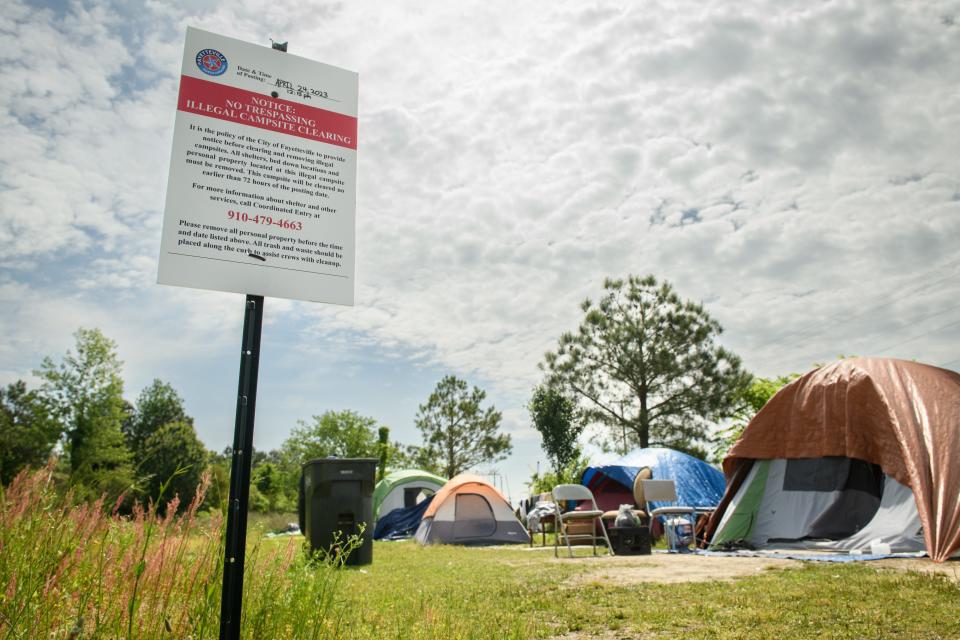Fayetteville officials say Gillespie Street encampment will be cleared next week
The city of Fayetteville will clear an encampment of homeless people under the Martin Luther King, Jr. Freeway on Gillespie Street next week, officials said Tuesday.
Members of the City Council’s Homelessness and Mental Health Committee heard from Brook Redding, a special projects manager with the City Manager’s Office, at its Tuesday morning regular meeting. Redding said Tuesday the encampment was only being cleared after months of city officials working with the people living there as part of a pilot program called the Impact Reduction Program.
That program has been three years in the making, with city employees first evaluating the issue of encampments in April 2020, Redding said.
“It’s dedicated to reducing the negative impact of homeless and public camping in the city,” he said.

The city conducted a formal analysis of what it could do about the issue in 2021, and in 2022, the City Council instructed employees to work with the Fayetteville-Cumberland County Continuum of Care, Redding said. The Continuum of Care is a collaboration between the city, Cumberland County and local agencies and nonprofits that connects homeless people with resources and develops strategies to tackle homelessness locally, according to its website.
The City Council voted in August to prohibit camping on city property, and the Cumberland County Board of Commissioners passed a similar ordinance in December prohibiting “camping or establishing a camp on county property.” This means that individuals camping on such property can be charged with trespassing, but Redding emphasized that charging those experiencing homelessness is not the goal of the Impact Reduction Program.
Instead, he said, the program aims to center compassion and empathy in its interactions with the city’s homeless population while guiding them to alternative options. Encampments like the one on Gillespie Street can turn unsanitary and pose a safety risk to those living there and residents in the area, Redding said.
A lengthy process
The Impact Reduction Program operates under a four- to six-week phased approach, he said. At encampments identified by the city as high-risk — though it was unclear exactly how the city makes this assessment — officials begin by talking with residents at the camps, handing out flyers and encouraging them to seek out available resources, Redding said.
Redding added the city will consider publicly sharing how it qualifies sites as high-risk after Councilman Mario Benavente, the chair of the Homelessness and Mental Health Committee, asked if it was possible to do so.
For many, he explained, the encampments are only a temporary solution.
“There’s a transitional element to these types of camps,” Redding said.
Related: Your guide to the five biggest issues Cumberland County faces in 2023
In some cases, like with the Gillespie Street camp, the city will provide trash cans and portable toilets to create a more sanitary environment, he said. At the Gillespie Street camp, officials felt they had done all they could to mitigate the situation after working with the people living in that camp for more than two years, Redding said. A notice to clean up trash at the site was posted in October, but the situation didn’t improve, he said.
A notice to vacate the site of the camp was posted by the city on Monday, Redding said. Residents of the encampment were given a 10-day notice instead of the program’s customary three-day notice because of the size of the community, with more than 20 tents at the site, he said.
A difficult task
During the meeting, Councilman Mario Benavente, the chair of the Homelessness and Mental Health Committee, said the encampments present a difficult issue to tackle, but he was pleased with the actions taken by the program.
“I feel comfortable with what we’re doing right now, which I feel like is an in-between,” Benavente said.
Related: 'The ordinance is a joke:' Is it a crime to be homeless in Fayetteville?
Redding told committee members the program has worked to connect individuals at the Gillespie Street camp with resources, but not everyone at the site wanted them, in part because the residents of the camp feel connected.
“This one has had a good amount of time to grow as a community,” Redding said.
The Gillespie Street encampment is scheduled to be cleared on Wednesday, and those who refuse to leave can be charged with trespassing at that point, he said.
“That part is uncomfortable,” Redding said.
Related: Fayetteville takes steps to clear out homeless camps near downtown library
However, he noted, most people living at the site seemed excited about the prospect of temporary housing and rental assistance, which the program provides through funding from Urban Ministry, a Fayetteville nonprofit.
Councilwoman Brenda McNair said Redding’s team was doing good work and noted the challenge of helping those who may be skeptical or hesitant about accepting available resources.
“We cannot force them to accept what’s good for them,” she said.
Public safety reporter Lexi Solomon can be reached at ABSolomon@gannett.com.
This article originally appeared on The Fayetteville Observer: Fayetteville officials move to clear out Gillespie Street encampment

